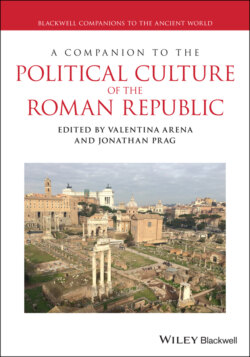Читать книгу A Companion to the Political Culture of the Roman Republic - Группа авторов - Страница 41
3.7 English Republicans and Machiavelli
ОглавлениеThe Roman Republic was not merely a static model for English republicans, but a historical exemplum, and they drew lessons from its development and eventual demise as well as from its institutions. In doing so, they could draw on modern interpretations including Machiavelli’s provocative republican reading of Rome’s early history in his Discourses on Livy (see Chapter 2). Machiavelli’s enthusiasm not just for the popular elements of the Roman constitution, but also for the tumults which resulted from the struggle between the patricians and the people, made some republicans uneasy: Milton’s account of Roman history in the Readie and Easie Way was an exact and deliberate inversion of Machiavelli’s account in his Discourses on Livy (Dzelzainis 2014). Nonetheless, even Harrington, that great seeker after stability, praised Machiavelli as the only recoverer of ancient political wisdom (Harrington 1977: 161). Others accepted the full implications of Machiavellian republicanism, complete with tumult, and embraced Machiavelli’s explanation of the course of Roman history. Nedham, in his Mercurius Politicus editorials, emphasised the unwillingness of Rome’s rulers in the very early years of the Republic to grant true liberty and the tight control on power exercised by the patrician order through the senate. It was only once the people had ‘compelled the Senators to grant them an Interest in Offices of State, and in the Legislative power’ that Rome became truly free and achieved greatness. His account of the end of the Republic, too, was the reverse of Milton’s: it was ‘when the Senate afterwards worm’d the People out of Power’ that ‘Rome lost her liberty’ through the degeneration of senatorial factionalism into civil war (Nedham 1651: 1100–1111). Harrington essentially agreed: ‘Rome fell by the ambition of the nobility’, not (like Athens) through the ‘headiness of the people’ (1977: 184), and the lack of either an agrarian law or rotation of senatorial office enabled the nobles to accumulate the wealth and power which unbalanced the state. England needed to learn the lesson.
While the obvious (and hopeful) analogue for the young English Republic was early republican Rome after the expulsion of the Tarquins, comparisons to the early Republic were often overshadowed or displaced by references to the fate of the late Republic. Indeed, the civil wars of the mid-seventeenth century had been read as analogous to the civil wars of the late Roman Republic (Norbrook 1999: 23, 83), a parallel which cast doubt on the idea that England might be progressing into a republican phase in its history. The obfuscations of the early imperial period at Rome, when the constitutional forms of the Republic were hollowed out but outwardly preserved, offered a more sinister and Tacitean model for reading what was going on in England, especially as Cromwell rose to power. Marchamont Nedham, before his prison-induced conversion to the cause of the new regime, wrote a pamphlet which advised the new regime to go easy on opposition pamphleteers. Drawing virtually all of his classical and modern examples and references, unacknowledged, from a volume of German tracts on arcana imperii (the mysteries of rule), he advised the Council of State to do what Augustus and Tiberius had done when they assumed rule over what had been a republic for nearly 500 years: deploy the simulacra of liberty to mollify the people, without conceding real liberty. This may have been intended as helpful (and personally advantageous) advice, or it may have constituted a sly accusation that the new ‘free state’ was anything but free (Foxley 2013). Either way, it raised the possibility that the new free state should not compare itself with the virtuous Roman Republic but with the Tacitean world of the early principate and its morally dubious statecraft.
The Roman Republic offered both models and warnings to English republicans. Tales of Roman valour were a common currency which republicans could exploit to their advantage. Beyond that, the meaning of the Roman Republic was deeply contested, even among republicans: its birth, its institutions and its death were read differently according to authors’ commitments and circumstances. The English Republic was only to emulate Rome’s military glory for the briefest of moments. Eleven years did not prove long enough to inculcate in the English the famous Roman love of liberty.
